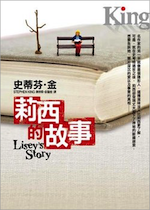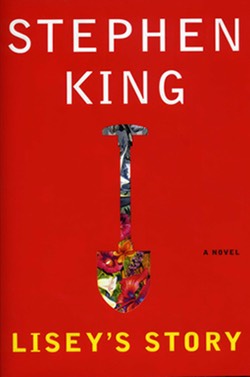By the time he got to Lisey’s Story, King had written himself into a dead end. His Dark Tower series was finished. He had been in so much pain from his accident that he announced his retirement in 2002 and his books since then felt increasingly exhausted. From a Buick 8 was about the limitations of fiction, and The Colorado Kid was about the failure of stories to actually solve anything. Cell was a dark book about the old world dying, and a new world of constant struggle being born that destroyed everything King found worthwhile — from schools to language.
He was also physically exhausted. The 1999 van accident had caused previously undetected damage to his right lung that turned into walking pneumonia in mid-November, 2003. Nevertheless, he attended the National Book Awards on Nov. 19, 2003 to receive his Medal for Distinguished Contribution to American Letters and gave a big, combative, rousing speech, begging the jurors of the National Book Awards to include more popular fiction in their nominations (a plea they ignored, judging by subsequent NBA shortlists). A lot of words were typed about King’s National Book Award speech, some folks finding his comments defensive, others finding them offensive, but no one mentioned how much of his speech had been about Tabitha King, his wife. Over half the speech is about how the award belongs to her because her love and dedication allowed him to write, and how she was there when he was poor and without prospects, and she was still there when he’s got an award around his neck and the world at his feet.
No one much commented, either, on how four days later King was hospitalized for pneumonia, and underwent surgery to remove scar tissue and fluid from his lung. During his week in the hospital, Tabitha redecorated his writing studio. When he came home, she still wasn’t finished, and the door was closed. “I wouldn’t go in there,” she told him. “It’s disturbing.” He went in there. All his books and papers were packed, the shelves were bare. Having cleaned out his mom’s house after her death, he realized that this is what it would look like when he died and his wife had to do that final cleaning. The speech, the pneumonia, the dead office, all combined to become Lisey’s Story, finally published in October, 2006. But actually, its origins go back all the way to 1968.
 Originally intended to be a comedy about the wife of a famous author who’s the secret to his success, constantly bailing him out behind the scenes but never receiving any of the credit, Lisey’s Story got dark, fast. Instead of unfolding in a series of incidents where National Book Award and Pulitzer Prize winning author Scott Landon has to have his fat pulled out of the fire by Lisey, his wife, the book revolves around one incident: the 1988 shooting and near-death of Scott Landon at a routine ground breaking for a school library. Landon’s invited to say a few words and scoop out the first chunk of dirt with a ceremonial silver shovel, while Lisey hovers in the background getting patronized and belittled by the hosts who immediately dismiss the unemployed wife of a famous literary figure as a bit of fluff. But when a disturbed student named Gerd Allan Cole shoots Scott in the chest, it’s Lisey who saves the day with one swing of the ceremonial shovel.
Originally intended to be a comedy about the wife of a famous author who’s the secret to his success, constantly bailing him out behind the scenes but never receiving any of the credit, Lisey’s Story got dark, fast. Instead of unfolding in a series of incidents where National Book Award and Pulitzer Prize winning author Scott Landon has to have his fat pulled out of the fire by Lisey, his wife, the book revolves around one incident: the 1988 shooting and near-death of Scott Landon at a routine ground breaking for a school library. Landon’s invited to say a few words and scoop out the first chunk of dirt with a ceremonial silver shovel, while Lisey hovers in the background getting patronized and belittled by the hosts who immediately dismiss the unemployed wife of a famous literary figure as a bit of fluff. But when a disturbed student named Gerd Allan Cole shoots Scott in the chest, it’s Lisey who saves the day with one swing of the ceremonial shovel.
Years later she’s thinking back on the incident because she found a newspaper clipping about it as she’s cleaning out her dead husband’s office, a task she’s put off for two years. Academics, fans, and book collectors circle her like vultures, badgering her to donate Scott’s papers to one library or another, to let them paw through his papers for unpublished work, to pick over his corpse one last time. Lisey resists until one of the academics (the unfortunately named Joseph Woodbody) hires a psycho calling himself Zack McCool to scare her into donating the papers to the University of Pittsburgh, or else. So that’s Lisey’s Story, right? It’s a book about a psycho stalking a woman still mourning her dead, famous husband. Except, it’s also a novel about the relationship between Lisey and her three sisters, Amanda (whose mental issues cause her to withdraw into catatonia), Cantata, and Darla. And it’s also a book about a magical secondary world called Boo’ya Moon. And it’s also a book about child abuse. Also, in case that wasn’t enough, it’s a book about insanity. And, finally, it’s a book about the wellspring of creativity that exists in the center of the world. Like a bachelor’s casserole, it’s kind of a got a little bit of everything from the fridge in it.
 Ever since Ben Mears in ’Salem’s Lot, King has written about writers who both come up with crap titles (Air Dancing, Coster’s Daughter, Fast Cars) and who destroy the lives of the people around them. Things have gotten a bit more subtle since Jack Torrance chased his wife around the Overlook Hotel with a croquet mallet, but Lisey’s life is still bent all out of shape by her husband’s struggle to avoid his family history of insanity. He’s mutilated himself a few times, and he’s given to somewhat cruel practical jokes, but she’s always been there to pick up the pieces and bring him back to earth. Now that he’s dead he’s left a series of clues for her to follow that will allow her to save herself from Zack McCool by journeying into Scott’s past and figuring out how to travel to the make believe land he can magically transport himself to called Boo’ya Moon.
Ever since Ben Mears in ’Salem’s Lot, King has written about writers who both come up with crap titles (Air Dancing, Coster’s Daughter, Fast Cars) and who destroy the lives of the people around them. Things have gotten a bit more subtle since Jack Torrance chased his wife around the Overlook Hotel with a croquet mallet, but Lisey’s life is still bent all out of shape by her husband’s struggle to avoid his family history of insanity. He’s mutilated himself a few times, and he’s given to somewhat cruel practical jokes, but she’s always been there to pick up the pieces and bring him back to earth. Now that he’s dead he’s left a series of clues for her to follow that will allow her to save herself from Zack McCool by journeying into Scott’s past and figuring out how to travel to the make believe land he can magically transport himself to called Boo’ya Moon.
King has said that he and Tabitha aren’t models for Scott and Lisey but he’s pulling so many details from his life (a handcranked printing press in his childhood basement, chewing aspirin, writing to high decibel rock) and his other books (a private cemetery out of Pet Sematary, the Overlook-esque Antlers Hotel, a killer fan out of Misery, laughter as a weapon as in It, the Long Boy who bears a striking resemblance to Pet Sematary’s Wendigo) that it’s hard for this not to feel like a personal statement. Lisey’s Story is written in a high blown state of hysteria and agitation. It’s not a meditation on death and marriage, it’s an AC/DC album about death and marriage. King can’t relax about anything. He wants to write about the secret language couples develop between them and then he hammers that point home over and over again for the hard of hearing, which becomes the book’s most off-putting characteristic. King has always liked to make up words, from the ka-tets and bah-bos of the Dark Tower books to the Rasts! and Gooms! of Cell, but here he’s really going for it. The invented language that Lisey and Scott speak is a cloying baby talk full of awkward phrases (“Strap on whenever it seems appropriate, babyluv’) and infantile profanities, “shutupsky”, “bad-gunky”, and the worst offender of all “smucking” which appears, quite literally, on every other page.
 King often fixates on a phrase that will bubble through his books, like “Full Dark” that first appeared, I believe in 2006’s Cell, then again in Duma Key before becoming the title of his 2010 short story collection, Full Dark, No Stars. But his use of words like “boogery” from book to book can start to seem annoying because of how awkwardly they sit in your mouth, and the the “smucks” and “smuckings” of Lisey’s Story are like wooden bats hitting you in the eyes. Even a last minute explanation of its origin does less to endear the word to the reader, than to serve as one more iteration of an annoying stylistic tic. Which isn’t to say this is a bad book. King fully inhabits Lisey’s skull, and she comes alive on the page the way Dolores Claiborne and Carrie White did in their self-titled books. Even better, way back in 1968, King’s writing workshop teacher, Burton Hatlen, taught him that there is a common pool in the center of our culture’s mental landscape and it’s from this pool that everyone gets their ideas. King literalizes this idea, making the pool the main feature of Boo’ya Moon, a pocket universe you can only travel to if you can visualize its imaginary landscape fully and completely, the same way a writer has to imagine his fictional settings into being. King not only manages to give our collective unconscious a physical landscape, but he also uses it as the setting for a beat-the-clock ending drenched in good old supernatural suspense. Weirdly, the book’s biggest deficiency is its baddies, Zack McCool and Joseph Woodbody. King had sympathy for Annie Wilkes in Misery despite how monstrous she became, but he has none for Woodbury and McCool and they never evolve much beyond a stock sniveling academic Snidely Whiplash and one of King’s evil Southern shitkickers, which is too bad since, although the book is about so much more than their plot to steal Scott’s papers, ultimately they are the core around which its action revolves.
King often fixates on a phrase that will bubble through his books, like “Full Dark” that first appeared, I believe in 2006’s Cell, then again in Duma Key before becoming the title of his 2010 short story collection, Full Dark, No Stars. But his use of words like “boogery” from book to book can start to seem annoying because of how awkwardly they sit in your mouth, and the the “smucks” and “smuckings” of Lisey’s Story are like wooden bats hitting you in the eyes. Even a last minute explanation of its origin does less to endear the word to the reader, than to serve as one more iteration of an annoying stylistic tic. Which isn’t to say this is a bad book. King fully inhabits Lisey’s skull, and she comes alive on the page the way Dolores Claiborne and Carrie White did in their self-titled books. Even better, way back in 1968, King’s writing workshop teacher, Burton Hatlen, taught him that there is a common pool in the center of our culture’s mental landscape and it’s from this pool that everyone gets their ideas. King literalizes this idea, making the pool the main feature of Boo’ya Moon, a pocket universe you can only travel to if you can visualize its imaginary landscape fully and completely, the same way a writer has to imagine his fictional settings into being. King not only manages to give our collective unconscious a physical landscape, but he also uses it as the setting for a beat-the-clock ending drenched in good old supernatural suspense. Weirdly, the book’s biggest deficiency is its baddies, Zack McCool and Joseph Woodbody. King had sympathy for Annie Wilkes in Misery despite how monstrous she became, but he has none for Woodbury and McCool and they never evolve much beyond a stock sniveling academic Snidely Whiplash and one of King’s evil Southern shitkickers, which is too bad since, although the book is about so much more than their plot to steal Scott’s papers, ultimately they are the core around which its action revolves.
Lisey’s Story took a little over two years to write and it came out ten months after Cell. With big aspirations, a huge wordcount (528 pages to Cell’s 350), and King’s National Book Award behind it, Scribner pushed Lisey hard, printing 1.1 million copies and distributing 7,000 ARCs, the most they’d sent out since they first acquired King with Bag of Bones all the way back in 1998 (for which they’d printed 1.2 million books). They also pushed independent bookstores hard to carry the novel, since they detected some softness in that market for King’s fiction. King even agreed to do a publicity tour for the book, which is normally something he hates. Nevertheless, the book refused to break out of the pattern that had been set with From a Buick 8. Sales leveled off at about 1.2 million copies, and it debuted at number one on the New York Times bestseller list, falling off after the now-standard 10 weeks. That’s nothing to sneeze at, but it’s a far cry from the days of Gerald’s Game (1992) when King’s time on the list averaged 30 weeks.
 Lisey delivers a big, fat, epic story, and King fully inhabits it, but it’s his most mannered and self-conscious book, written in a kind of overheated style that reminds me of Gerald’s Game, Dolores Claiborne, and Rose Madder. It’s a thunderflash of a book, a storm of invented language, internal monologues, shifting fonts, dark secrets, true love, meditations on marriage and mortality, violence, and trumpet blasts of surreal incident. King’s blowing everything he knows about life and love onto the page, veering from the grotesque to the sentimental but mostly hugging the sweet spot in the middle of the lane. And yet, despite the fact that he asked Scribner editor-in-chief Nan Graham to edit it instead of his usual editor, Chuck Verrill, in order to make sure that Lisey’s voice came across as authentically female, it’s a big, loud, and ultimately very male book, full of fury and flash. Think of a Valentine from a guilty lover, who insists on sending four hundred roses when a dozen would do. And as for the intended recipient of this love letter, Tabitha King?
Lisey delivers a big, fat, epic story, and King fully inhabits it, but it’s his most mannered and self-conscious book, written in a kind of overheated style that reminds me of Gerald’s Game, Dolores Claiborne, and Rose Madder. It’s a thunderflash of a book, a storm of invented language, internal monologues, shifting fonts, dark secrets, true love, meditations on marriage and mortality, violence, and trumpet blasts of surreal incident. King’s blowing everything he knows about life and love onto the page, veering from the grotesque to the sentimental but mostly hugging the sweet spot in the middle of the lane. And yet, despite the fact that he asked Scribner editor-in-chief Nan Graham to edit it instead of his usual editor, Chuck Verrill, in order to make sure that Lisey’s voice came across as authentically female, it’s a big, loud, and ultimately very male book, full of fury and flash. Think of a Valentine from a guilty lover, who insists on sending four hundred roses when a dozen would do. And as for the intended recipient of this love letter, Tabitha King?
“I don’t think she’s real crazy about this book, to tell you the truth,” King said.
 Grady Hendrix has written for publications ranging from Playboy to World Literature Today; his previous novel was Horrorstör, about a haunted IKEA, and his latest novel, My Best Friend’s Exorcism, is basically Beaches meets The Exorcist.
Grady Hendrix has written for publications ranging from Playboy to World Literature Today; his previous novel was Horrorstör, about a haunted IKEA, and his latest novel, My Best Friend’s Exorcism, is basically Beaches meets The Exorcist.










